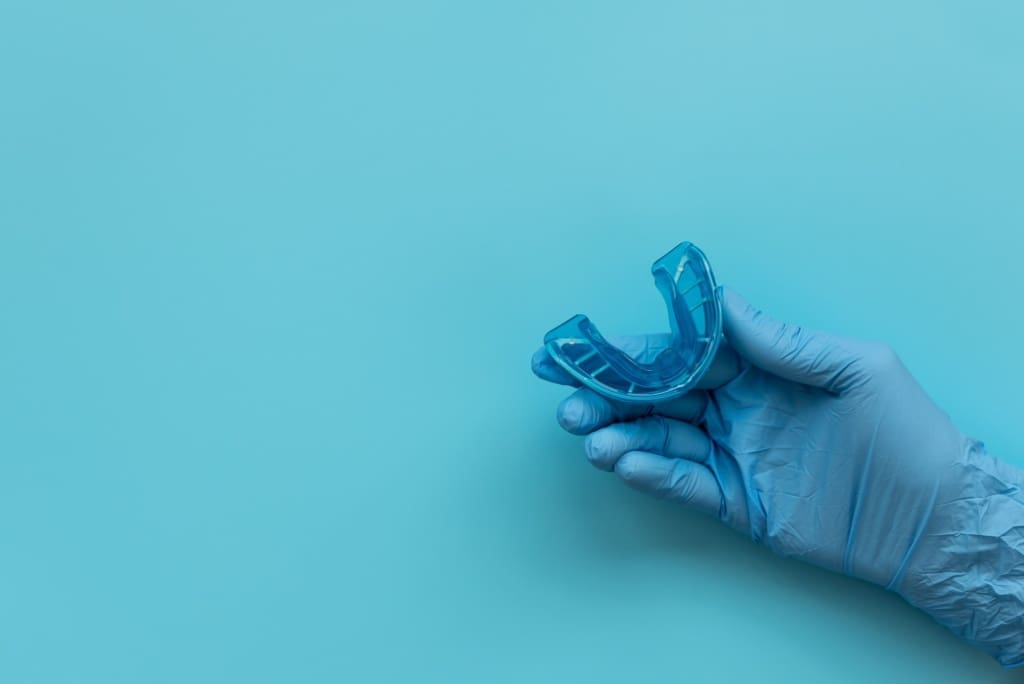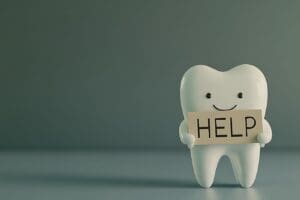Teeth grinding is one of the most common dental issues many people experience. Teeth grinding is a condition known as bruxism, in which a person unconsciously clenches and grinds their teeth. Bruxism can be caused by stress, anxiety, sleep disorders, or a misaligned bite, which can cause damage to the teeth, leading to pain, headaches, and other issues. Treatment for teeth grinding may include lifestyle changes, though the first step is usually a mouthguard.
A mouthguard is a device worn over the teeth, usually at night, to protect them from grinding and clenching. It is made of soft, pliable material and fits snugly over the upper and lower teeth and prevents them from coming into contact with each other, reducing the effects of grinding. The mouthguard also helps reduce the tension in the jaw muscles, easing the pain associated with teeth grinding. However, many people do not consider using mouthguards because they think they are uncomfortable, which is never the case. In reality, it is only a matter of knowing when you need it, so we will discuss the signs a mouthguard is essential. These include:
#1 – You Experience a Headache When Waking Up
One of the most common signs that you may need a mouthguard is if you experience a headache when waking up. This is because bruxism can cause jaw pain and headaches, which can be relieved by wearing a mouthguard. The mouthguard prevents your teeth from grinding and clenching, reducing the tension in your jaw muscles and allowing your headache to dissipate. If you wake up with a headache, you must talk to your dentist about getting a mouthguard, which can help ease the pain and discomfort.
#2 – You Have Temporomandibular Joint Syndrome
Temporomandibular joint (TMJ) syndrome is a jaw joint disorder that can lead to pain and dysfunction. Symptoms of TMJ syndrome include pain in the jaw joint, difficulty opening and closing the mouth, earache, facial pain, and headaches. Sometimes, it can even cause a clicking or popping sound when the jaw is moved. If you are experiencing any of these symptoms, a mouthguard may be beneficial.
A mouthguard can help reduce the tension in the jaw muscles, reducing the pain associated with TMJ syndrome. It can also help to reduce grinding and clenching, which can further reduce the symptoms. Additionally, a mouthguard can help to reduce the chances of developing further damage to the jaw joint. If you are experiencing any symptoms of TMJ syndrome, you must talk to your dentist about getting a mouthguard.
#3 – You Have Chipped Teeth
A mouthguard is a great way to protect your teeth from further damage if you have chipped teeth. It can act as a protective shield between your teeth and whatever you may be grinding them against. It can also help reduce the pressure exerted on your teeth, which can help reduce the risk of further damage.
A mouthguard can also help chipped teeth by reducing the pain associated with them and preventing further chips from occurring. This can be especially helpful if the chipped teeth are located in the back of your mouth, as it can help to reduce the chances of biting down on the chips and causing more damage.
#4 – Your Sleep Is Frequently Interrupted
Sleep interruption can seriously affect a person’s mental and physical well-being, leading to fatigue, irritability, and difficulty concentrating. It can also lead to long-term health issues such as hypertension, diabetes, and heart disease.
Fortunately, wearing a mouthguard can help reduce sleep interruption. Mouthguards are designed to prevent teeth grinding and jaw clenching, two common causes of sleep interruption. By keeping the teeth and jaw in their natural positions, the mouthguard prevents the muscles from becoming tense and overworked. This helps the person to relax and sleep more soundly.
Mouthguards are also beneficial for those who snore. Snoring can be disruptive and a sign of a more serious medical condition. By keeping the airways open, the mouthguard can help to reduce snoring, allowing the person to get a better night’s sleep. On a related note, they can also help reduce sleep apnea, a disorder that causes pauses in breathing during sleep. It can be dangerous, and wearing a mouthguard can help to keep the airways open to prevent it.
Conclusion
Mouthguards are effective for reducing teeth grinding, regardless of the reason. It is custom-fitted to your mouth, so you can feel comfortable wearing it while sleeping. All that matters is consulting with your dentist first to ensure it is right for you, followed by regular maintenance to keep it in good condition.
Previously known as Clayton and Canby Dental, Northampton Dental Specialists Group can help you if you are looking for dentists in Northampton. Your oral health should never be skimped on, so we provide the best care to ensure it will be maintained and healthy. Call us today at (413) 584-5199 to request an appointment!





